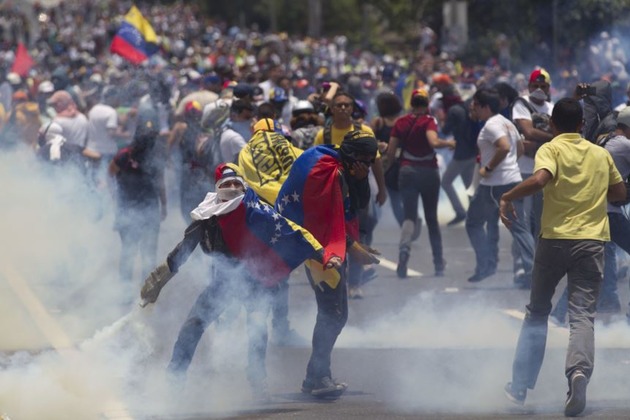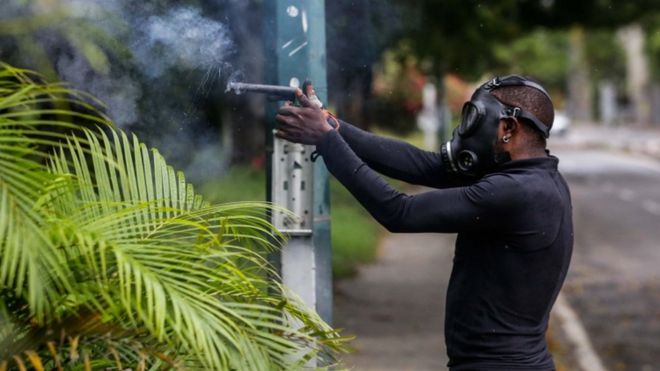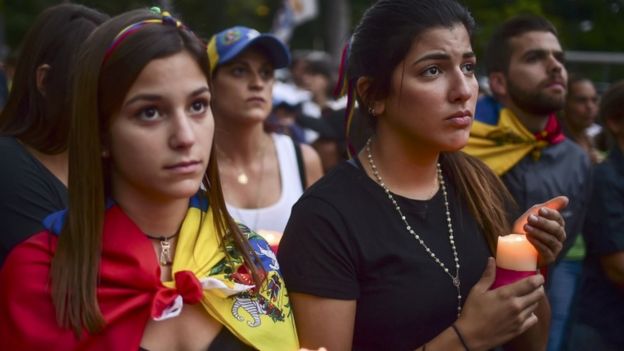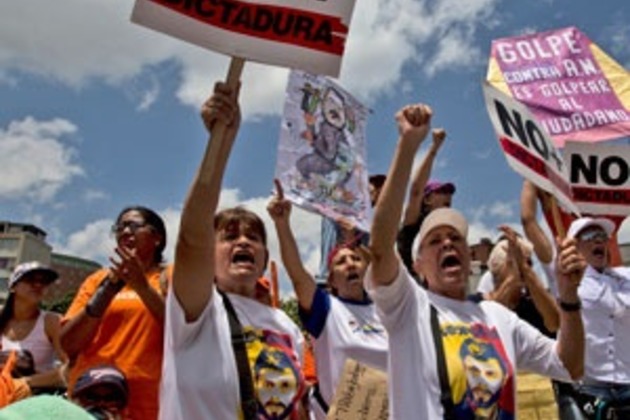basquebromance
Diamond Member
- Nov 26, 2015
- 109,396
- 27,002
- 2,220
- Banned
- #1
Socialism means a specific type of society (as explained by Marx). One WITHOUT an asset-owning ruling class. Does Venezuela have this? NO!
Follow along with the video below to see how to install our site as a web app on your home screen.

Note: This feature currently requires accessing the site using the built-in Safari browser.
/----Socialism means a specific type of society (as explained by Marx). One WITHOUT an asset-owning ruling class. Does Venezuela have this? NO!
 ...
... 
They are heading towards socialism. Even with autarchic communes that are already tolerated and supported by Maduro and may be implemented in the new constitution.Socialism means a specific type of society (as explained by Marx). One WITHOUT an asset-owning ruling class. Does Venezuela have this? NO!
Socialism means a specific type of society (as explained by Marx). One WITHOUT an asset-owning ruling class. Does Venezuela have this? NO!
I wonder if any of the DNC news outlets have reported on the disaster ongoing in Venezuela. I would guess not much...so, many American leftists have no clue.Socialism means a specific type of society (as explained by Marx). One WITHOUT an asset-owning ruling class. Does Venezuela have this? NO!
Wrong. Communism is where you get to the point of no asset owning ruling class. This has never been reached. All "communist" countries stopped at the dictatorship of the proletariat phase, which definitely had a ruling class that owned all the assets.
Venezuela is a mixed economy, but is mostly a command based one, with massive government ownership of the major means of production. It is definitely a socialist model government. It hasn't reached DotP status yet, but that may come soon.
I wonder if any of the DNC news outlets have reported on the disaster ongoing in Venezuela. I would guess not much...so, many American leftists have no clue.Socialism means a specific type of society (as explained by Marx). One WITHOUT an asset-owning ruling class. Does Venezuela have this? NO!
Wrong. Communism is where you get to the point of no asset owning ruling class. This has never been reached. All "communist" countries stopped at the dictatorship of the proletariat phase, which definitely had a ruling class that owned all the assets.
Venezuela is a mixed economy, but is mostly a command based one, with massive government ownership of the major means of production. It is definitely a socialist model government. It hasn't reached DotP status yet, but that may come soon.
It should be remembered that not long ago, that country was doing great economically. Much like Cuba before Castro. Funny how that happens, but somehow is missed by the American media and leftists everywhere.

Irked at the opposition leader’s statement, the president of the troubled country, Maduro accused Lopez of being a terrorist, while urging for peace. Debilitated by months of deadly anti-government protests, a failing economy and shortages of food and medicine, rising crime and a social unrest that refuses to die down, in recent weeks, Venezuela has suffered more escalation of violence. On Saturday, Lopez, who is the country’s most prominent jailed opposition leader, was transferred from military prison to house arrest by orders of the country's Supreme Court, that cited health concerns. Court President Maikel Moreno said that the court would re-evaluate Lopez's case due to "serious signs of irregularities."
Jailed in 2014, the 46-year-old leader of the Popular Will party face allegations of inciting anti-government protests that left more than 40 people dead and many more injured. Lopez was sentenced to 14 years in prison, following which, human rights groups and the opposition accused the ruling to be politically motivated charges. For months now, opposition and world leaders, including U.S. President Donald Trump had called for Lopez's release. Upon his release on Saturday, fellow opposition leader Henrique Capriles said on Twitter, “We are thrilled that Leopoldo Lopez is at home with his family. They should give full freedom to him and all the political prisoners.” Subsequently, Lopez addressed a crowd of people waving a Venezuelan flag and shouting, “Yes, we can!” from outside his house.

Lopez vowed to keep fighting against the Maduro government and said in a statement read by a party leader, "I maintain my firm opposition to this regime. I reiterate my commitment to fight until we win Venezuela's freedom." Later in the day, Maduro responded to Lopez in televised remarks, calling for the released leader to give a message of "peace and rectification." Maduro added that he respected the Supreme Court's decision to release Lopez and hoped the move would lead to reconciliation "because the nation wants peace." Meanwhile, on Saturday, a White House statement commented on Lopez's release and said, “We welcome Leopoldo Lopez's release from prison, however his confinement under house arrest and continued denial of basic human rights is unacceptable to the United States. All Venezuelans should be able to express their political beliefs freely and the United States continues to call for the immediate release of all political prisoners held by the Maduro regime.”
Meanwhile, Lopez's release comes at a time when Venezuelans have intensified their protest that have been ongoing for three months. So far, over 90 people have died in the anti-government protests and many more have suffered grave injuries. The opposition continues to call for early elections to oust Maduro from office in order to save the country from an economic and political downward spiral. Maduro meanwhile has reiterated his plans to form an assembly tasked with rewriting the constitution that opponents say is designed to entrench dictatorship. Voting for the constituent assembly is scheduled for July 30 and the opposition is planning to stage a boycott. However, according to analysts what has kept Maduro in power is that he still has the loyalty of military top brass.
MORE

Amid calls for the Human Rights Council to convene an emergency “special session” on the crisis, secretary-general Antonio Guterres’ spokesman explained that it was up to HRC member-states to decide on the agenda – and up to U.N. member-states at large to elect the members of the Geneva-based council. “The HRC is a legislative body of the U.N. and it is up to the members to decide on the agenda,” Stephane Dujarric told CNSNews.com from New York. “As for Venezuela’s membership on the HRC, it’s up to [U.N.] member-states to elect members of these legislative bodies. It’s not a process for the secretary-general to comment on.”
Dujarric added, however, that there was “ an expectation that every member-state will uphold the principals enshrined in the Universal Declaration of Human Rights and international covenants.” “As a matter of principle, those countries that sit on human tights bodies have an added responsibility.” Venezuelan police overnight arrested opposition leaders Leopoldo Lopez and Antonio Ledezma – the mayor of Caracas – a day after Maduro threatened to jail critics of Sunday’s controversial vote in favor of creating a constituent assembly to rewrite Venezuela’s constitution. At least ten people were reportedly killed in violence linked to the vote. “Maduro is not just a bad leader,” President Trump said in a statement read out by National Security Advisor H.R. McMaster. “He is now a dictator.” Asked during a press briefing in New York whether Guterres shares that view of Maduro, Dujarric said it was “not for the secretary-general to comment” on the U.S. assessment.
‘What can we do to create a change of conditions’
Secretary of State Rex Tillerson told reporters at the State Department that the administration was “evaluating all our policy options as to what can we do to create a change of conditions where either Maduro decides he doesn’t have a future and wants to leave of his own accord or we can return the government processes back to their constitution.” The U.S. Treasury Department earlier announced sanctions against Maduro “for undermining democracy in Venezuela.” The designation freezes any assets in the U.S. and prohibits any U.S. person or entity from doing business with him. It also includes a U.S. travel ban – six weeks before the annual high-level U.N. General Assembly session which Maduro has attended several times since becoming president in 2013 – and in earlier years as foreign minister.
Maduro joins a small group of heads of government to be personally sanctioned by the U.S. –Syrian President Bashar al-Assad, North Korean leader Kim Jong-un and Zimbabwean President Robert Mugabe. None of those other three countries have been members of the HRC in Geneva since its establishment in 2006. Venezuela has, however, twice – from 2013-2015, and now again for a three-year term in 2016-2018. Since all 193 members of the U.N. General Assembly elect members of the HRC it is only the General Assembly that can decide to suspend a member. It has only done so once – suspending Muammar Gaddafi’s Libya in 2011, although afterwards Venezuela’s envoy called the step premature and the Russian and Chinese ambassadors both insisted that it did not establish a precedent. This year, almost one quarter of the HRC’s 47 members are autocracies with poor human rights records.
‘If not now, when?’
Venezuela's electoral authorities have dismissed a claim that turnout in Sunday's controversial vote for a new constituent assembly was inflated. The firm behind the voting system said turnout was at least one million fewer than the government figure. But the head of the election council hit back, calling it an "irresponsible claim, with unfounded estimations". President Nicolás Maduro has said that the new assembly will be inaugurated on Friday.

A protestor confronts members of the National Bolivarian Guard during a demonstration against the vote for a Constituent Assembly in Caracas, Venezuela
The opposition see the assembly as an attempt by Mr Maduro to cling on to power. They boycotted the election and also held an unofficial referendum in which they said more than seven million Venezuelans voted against the constituent assembly. Turnout in Sunday's poll is seen as a key indicator of the level of support the government enjoys. The government said more than eight million people, or 41.5% of the electorate, had voted.
What are the allegations?
"It is with the deepest regret that we have to report that the turnout numbers on Sunday 30th July for the Constituent Assembly in Venezuela were tampered with," the boss of Smartmatic, Antonio Mugica, told journalists in London. He said a full audit was needed to establish the exact number of voters but he said the firm estimated there was a difference of at least one million.[ But Tibisay Lucena of the election council accused Mr Mugica of trying to "raise doubt over the result of the election".

The opposition holds the government forces responsible for most deaths in the past four months
Mr Maduro said the vote was free and fair and that it would not be tainted by "a company with its headquarters in London and its bank accounts in the United States". The opposition-controlled National Assembly has approved a request to open a criminal investigation into Smartmatic's claims. Separately, the Reuters news agency reported it had seen an internal memo from Venezuela's electoral authorities saying fewer than four million votes had been cast just two hours before polls closed.
So where next?
Spain and the head of the European Parliament have both pressed for sanctions following a controversial election that critics say is a bid by Venezuelan President Nicolas Maduro to stay in power, and the arrest of two opposition leaders. The United States earlier this week hit Maduro with sanctions, and diplomats from the 28 EU nations were meeting with EU diplomatic chief Federica Mogherini in Brussels on Wednesday to discuss the bloc's course of action. "Consultations with member states are ongoing to ensure an appropriate and coordinated response by the EU. Obviously the whole range of actions are discussed," said Catherine Ray, Mogherini's spokesperson, when asked if sanctions were on the table. "But our priority is the urgent relief of the Venezuelan people and de-escalation of the tensions. We promote a political solution to the crisis and we are ready to further support ongoing regional mediation efforts," Ray told a daily briefing. There was opposition from some EU states to any kind of sanctions, which would scupper them as sanctions must be approved unanimously, diplomatic sources said.
'World sanctions regime'
The 28 EU countries are now working on a common declaration that is expected to be published later Wednesday. "The declaration is supposed to mention 'other measures'. But no talk so far on sanctions," a European source told AFP on condition of anonymity. The EU has previously warned that it has "grave doubts" about recognising an election for a constituent assembly that would hand Maduro more powers, and condemned the arrest of high-profile opposition figures Leopoldo Lopez and Antonio Ledezma. Spanish Foreign Minister Alfonso Dastis said on Tuesday that he had contacted Mogherini to "kickstart a process to adopt additional restrictive measures" such as travel bans to target those responsible for the crisis in Venezuela.

Madrid was against taking wider economic "sanctions that could affect people" in Venezuela. European Parliament chief Antonio Tajani has also pushed the bloc to go further, writing on Tuesday to European Council head Donald Tusk and European Commission boss Jean-Claude Juncker to ask them to consider sanctions against Maduro and his circle. British junior foreign minister Alan Duncan appeared to play down the likelihood of EU sanctions. Duncan said there "may come a point where we will become part of a world sanctions regime, for instance if the United Nations were to impose one then we would."
EU mulling range of actions on Venezuela
Claiming to be socialist like claiming to be democratic is just rhetoric for masses.Socialism means a specific type of society (as explained by Marx). One WITHOUT an asset-owning ruling class. Does Venezuela have this? NO!